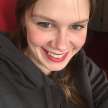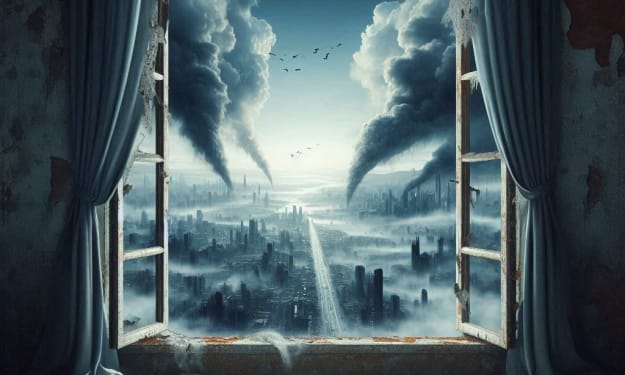
Hope gazed out at the eerie black water. Gentle waves were crashing against the shore. The elders liked to talk about how it was before. How there was nothing left. But nothing was too empty a word for what surrounded her. There were plants, but they were dead. There was land, although much of it was under the water now. There were animals, but they were few. There were people, but they were dying.
Nine times the earth had passed through its miserable cycle since the event. Hope had been born the year before that. She was nine years old now. Nine… a fine age really. The eldest in their compound were dying at thirty. Many didn’t make it that far.
“The air is different, now,” her mother had said before passing, “breathing is not what it used to be.”
Breathing had been taken for granted in the old world. Now every breath was a leap away from life. Only those who were never born were spared the pain of breathing. Perhaps it would have been better never to have been born. The value of life was gone. A value previously believed indisputably intrinsic had disappeared along with the prospect of a future.
Hope did not understand. This was the world as she had always known it, a forsaken place, where people died around her every day. People hadn't all suddenly died when the world ended. Some did. Some died in the preceding wars, some starved to death, some suffocated almost instantly, the rest were dying slowly from the effects of the poison in the air and water. Fertility had long gone. No babies had been born for nine years. We are the last.
She sat down on the slimy rocks, observing the dead trees and the nervous surface of the water, imagining the decay in the depths. Bored, she threw a rock. “Pointless,” the elders said. Everything was pointless. No future for the young, no point for the old.
We are the last. Hope knew that much. She knew little of what went on before the event, even those who remembered had long given up speaking of it. It didn’t matter anymore, nothing did.
Of the event she knew as much as everyone else. The Earth was already dying. The temperatures were raising, the ice caps were melting, the bees were gone, the crops stopped growing, people stopped caring. It had started long before the wars, centuries before even. With each passing generation people became increasingly aware that their endeavors were futile. People were no longer able to find meaning in setting goals of any sort. What was the point of curing deceases, rearing children, creating art or learning new skills when no one was going to be around much longer? Leaving something for posterity became pointless, as posterity itself started to look unlikely. People stopped talking to each other, thinking they were all alone in their meaningless misery. It started as anxiety, collective anxiety. Then the world ended, and misery was all that was left.
Yet there had been people still fighting the impending extinction, even when everyone else had given up. Fools, they were called, then and now. As a vast starving population waged wars on each other, eccentric hopefuls were experimenting with technology to reverse the disaster. Perhaps they were simply too late, perhaps the nuclear wars had pushed the planet beyond saving. All that people now knew was that the experiments had been a disaster. Everything had died. The air turned to poison. Those that now inhabited the planet were the scared and scattered descendants of the many, and they too were dying.
Hope stood up and looked towards the dilapidated settlement she called home, wondering when she would next eat. Over westwards was the carcass of what used to be a city. The older kids had left for the carcass at some point during the night. Was it too much to hope that they might bring back some food? Hope knew they wouldn’t. If they survived the exposure, they would keep the food for themselves and probably never come back. Perhaps someone would track down an animal to eat, but this was unlikely. She started making her way along the water. Things sometimes washed up from the drowned towns below.
The sky was no longer beautiful. It was red and angry. Diabolical. Something in the atmosphere was blocking out the stars. Hope had never seen them. The landscape could only be described as dead, barren, gone. The last humans lived in a bubble of despair and retrospection, with no view of the stars.
Were there people out there, Hope wondered. There were stories of humans who made it of the planet before it was too late. Some stories even claimed that somewhere hidden and safe, an underground sanctuary had been built to accommodate those who had been important in the old world. By important, the stories meant wealthy, but Hope had no concept of wealth. Money can’t buy anything when there is nothing to buy. In this world, people didn’t pay for things, they just took them. Hope had seen young boys risk their lives for a tin of beans; life wasn’t worth as much. The only places where food could be found where not easy to access. You’d have to be lucky to get anything without a fight. Greed and violence were the only things left of the old world.
Hope stopped in her tracks and squinted at something ahead near the brink of the lake. Something had washed up. She saw as she got closer that it was a backpack of some sort. Hungrily, Hope opened it and emptied its contents out on the dusty, cracked ground away from the water.
Some blankets fell out along with an electric torch, some paper and a heart-shaped locket, worthless in this world. Hope tried the torch; a faint light went on in the light bulb. Her cracked hands trembled; someone might trade batteries for food. She looked through the papers swiftly, certain they would be of no interest. But something caught her eye. It was a large piece of card. She folded it out with difficulty. It had been drenched but was now dry. On it could be seen a peculiar pattern-like image on a faded blue background. Many little dots covered the chart, with varying distances between them, their positions mostly random. In some places the dots were joint up with faint lines so that something resembling characters and animals was discernible. Some of the characters were labelled, but Hope couldn’t make out what the labels said. She could, however, discern the large letters across the top, saying: ‘Star Map’.
Maddening excitement gripped her, and she grinned for the first time in weeks. The stars? These were the stars? That’s what the sky looked like back in the old world? She lay down on the ground with the map above her. Each of the dots is another system, another star, she thought. So, there must be other planets out there. Somewhere out there, a civilization is only just dawning. Somewhere out there, there is meaning and hope still. There could be no humans out there. Stories are just stories, only in stories does a species go on forever.
The discovery of the star map greatly cheered the young child. For it felt less important now that soon the last human would die. Perhaps one day the earth will breathe again, she thought, perhaps another world, better than the old, will arise. Perhaps out there an alien species is making better choices, perhaps they’ll come here one day and learn from us, as they dig out of the dust our gruesome cities. Perhaps someone out there has plenty of food, plenty of greenery and a clear view of the sky.
Perhaps I shall never eat again, she thought, perhaps no human ever shall.
Someone will be the last. Someone will be standing at the end, contemplating the mistakes of mankind. Knowing that it is over, accepting a welcome end to the wretchedness of life. There shall be no one to mourn or blame or rage that we did not sustain what we had. No guilt for being what we are when we are no longer.
About the Creator
Ida Stokbaek
Hello!
This is where I procrastinate.
Can't believe you're here!
Thank you!
Enjoyed the story? Support the Creator.
Subscribe for free to receive all their stories in your feed. You could also pledge your support or give them a one-off tip, letting them know you appreciate their work.






Comments
There are no comments for this story
Be the first to respond and start the conversation.